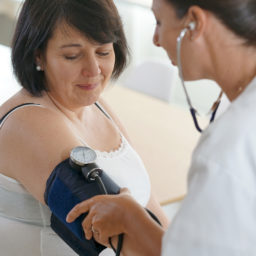 Did you know that heart disease has been the leading cause of death in the United States for the last 80 years running? Currently, nearly half of adults in the U.S. have hypertension, or high blood pressure. Poorly managed high blood pressure leads to heart attacks and strokes, the main causes of medical disability. Sadly, only one in four adults with hypertension have their condition well controlled.
Did you know that heart disease has been the leading cause of death in the United States for the last 80 years running? Currently, nearly half of adults in the U.S. have hypertension, or high blood pressure. Poorly managed high blood pressure leads to heart attacks and strokes, the main causes of medical disability. Sadly, only one in four adults with hypertension have their condition well controlled.
While a normal blood pressure reading is 120/80 mm Hg, elevated blood pressure is defined as greater than 130 mm Hg systolic (the first or upper number) over 80 mm Hg diastolic (the last or lower number). There are no concrete physical symptoms of hypertension, which is why it is known as the “silent killer.” The only way to know if you have high blood pressure is to get it checked regularly at a pharmacy, with your doctor, or with an automatic blood pressure cuff.
Causes of high blood pressure
High blood pressure is treatable and preventable! To understand this, let’s look at why it develops. As you age, the vascular system loses its ability to easily and efficiently dilate, or expand. Vessel walls lose their elasticity, becoming stiffer and more narrow. This increases the blood pressure for the system. But, age is not a pathology, and to merely deduce “getting older” as the only issue dismisses the whole pathophysiology of a problem. Younger people can have high blood pressure as well, given the circumstances. So, why else does hypertension happen?
Nitric oxide is a compound that dilates blood vessels and is attached to the amino acid arginine. As we accumulate oxidative damage through inflammation, poor nutrition, and stress, arginine is depleted in the tissue, making nitric oxide scarce. Lack of nitric oxide means vessels can’t dilate easily, causing them to lose elasticity and stiffen, which increases pressure. You’d think just giving arginine should solve the problem, but it does not.
Too much arginine in the tissues increases herpes simplex virus expression, so it is not the first amino acid of choice in people with this virus. Depleting arginine in tissues is actually associated with suppressing this virus.(1) Giving arginine doesn’t really create a consistent, steady state in tissue that well. The arginine precursor L-citrulline actually increases cellular arginine more efficiently in the tissues, without the risk of expressing herpes simplex virus. L-citrulline supplementation keeps arginine stores consistent, therefore optimizing nitric oxide in the tissue. This support better stabilizes blood pressure and decreases vascular stagnation, improving blood flow.
Stabilizing blood pressure
There are many other areas of focus to support healthy blood vessels and establish stable blood pressure. In addition to L-citrulline, advancing lymphatic drainage, improving heart efficiency, and healing endothelium (the inner lining of blood vessels) are effective strategies to optimize cardiovascular health.
Good lymphatic drainage reduces swelling in tissue, thus improving blood pressure, much like clearing a log-jam on a river. Exercise and movement, alternating hot and cold applications, and massage are three ways to help swollen tissue. In addition, grape seed extract has been proven to help lymph drainage. In one study of women with lower leg swelling due to sedentary conditions, grape seed extract was found to significantly reduce tissue edema (swelling caused by excess fluid).(2) When you clear swollen tissue you reduce stagnation, allowing better efficiency with your cardiovascular system.
Strengthening the heart muscle undoubtedly improves cardiac output, or the amount of blood the heart pumps through the circulatory system. Athletic, young hearts beat efficiently. Weaker heart muscles pump poorly and are associated with high blood pressure. Cardiovascular exercise certainly improves the muscular capability of the heart. Many people walk as exercise, which is a great start, but truly getting the heart rate increased and pumping actually conditions the heart better. In addition, herbs like hawthorne have a vast history in herbal medicine for improving cardiac output and exercise tolerance, and stabilizing energy levels.(3) Hawthorne is a popular tea that you can drink regularly, but you will also see it in many cardiovascular, herbal formulas.
Lastly, healing the inner lining of the blood vessels is vital for minimizing stroke and heart attack risk. Smooth inner linings improve blood flow, lower inflammation, and stabilize blood pressure. There are specific antioxidants that have affinity for blood vessels. Green coffee bean extract is rich in chlorogenic acids, antioxidants that support the delicate inner endothelium.(4)
The flavonoid quercetin is another potent antioxidant that inhibits inflammatory signals harming blood vessels. It is known for its ability to improve endothelial cell dysfunction by maintaining normal inflammatory balance in specific pathways.(5) Think of antioxidants as cellular helpers, cleaning up damage and supporting cell chemistry.
As you can see, many supportive measures can be utilized to help improve your blood pressure. Two really great, all-encompassing products are NuMedica’s NOVA and OrthoMolecular’s CitraNOX. NOVA is an L-citrulline botanical formula that improves the utilization and tissue levels of nitric oxide, while CitraNOX is a product that focuses on endothelial function in addition to L-citrulline support.
Most people with high blood pressure don’t know they have it. Make sure you monitor this health marker regularly for yourself and seek your doctor’s care. Improving your ability to vasodilate (widen your blood vessels), strengthening your heart’s pumping ability, and healing blood vessels are great ways to love on your cardiovascular system. Stop by Peoples Rx today to learn more about these supportive products. If you have more extensive cardiovascular issues, work with one of our amazing practitioners by calling 512-219-8600 to schedule a free meet-and-greet today.
 Amy Nelson, ND* received her Naturopathic Doctorate from the National College of Natural Medicine in Portland, OR where she studied nutrition, homeopathy, herbal and functional medicine. In addition, Dr. Nelson was the Associate at The IBS Treatment Center in Santa Monica where she treated irritable bowel syndrome and complex food allergies. Dr. Nelson utilizes her experience in natural medicine to address female and male hormonal imbalances, mental health, and digestive disorders. Amy is available for consultation at Peoples Wellness Center.
Amy Nelson, ND* received her Naturopathic Doctorate from the National College of Natural Medicine in Portland, OR where she studied nutrition, homeopathy, herbal and functional medicine. In addition, Dr. Nelson was the Associate at The IBS Treatment Center in Santa Monica where she treated irritable bowel syndrome and complex food allergies. Dr. Nelson utilizes her experience in natural medicine to address female and male hormonal imbalances, mental health, and digestive disorders. Amy is available for consultation at Peoples Wellness Center.
*Although licensed in other states, Naturopathic Doctors are not currently licensed in Texas.
If you have comments and/or questions about this blog, email us at blog@peoplesrx.com.
1. (Griffith RS, DeLong DC, Nelson JD. Relation of arginine-lysine antagonism to herpes simplex growth in tissue culture. Chemotherapy. 1981;27(3):209-13. doi: 10.1159/000237979. PMID: 6262023.)
2. (Sano A, Tokutake S, Seo A. Proanthocyanidin-rich grape seed extract reduces leg swelling in healthy women during prolonged sitting. J Sci Food Agric. 2013 Feb;93(3):457-62. doi: 10.1002/jsfa.5773. Epub 2012 Jul 2. PMID: 22752876.)
3. (Koch E, Malek FA. Standardized extracts from hawthorn leaves and flowers in the treatment of cardiovascular disorders–preclinical and clinical studies. Planta Med. 2011 Jul;77(11):1123-8. doi: 10.1055/s-0030-1270849. Epub 2011 Mar 7. PMID: 21384315.)
4. (Watanabe T, Arai Y, Mitsui Y, Kusaura T, Okawa W, Kajihara Y, Saito I. The blood pressure-lowering effect and safety of chlorogenic acid from green coffee bean extract in essential hypertension. Clin Exp Hypertens. 2006 Jul;28(5):439-49. doi: 10.1080/10641960600798655. PMID: 16820341.)
5. (Sanchez M, Galisteo M, Vera R, Villar IC, Zarzuelo A, Tamargo J, Pérez-Vizcaíno F and Duarte J. Quercetin downregulates NADPH oxidase, increases eNOS activity and prevents endothelial dysfunction in spontaneously hypertensive rats. Journal of hypertension. 2006;24:75-84.)
